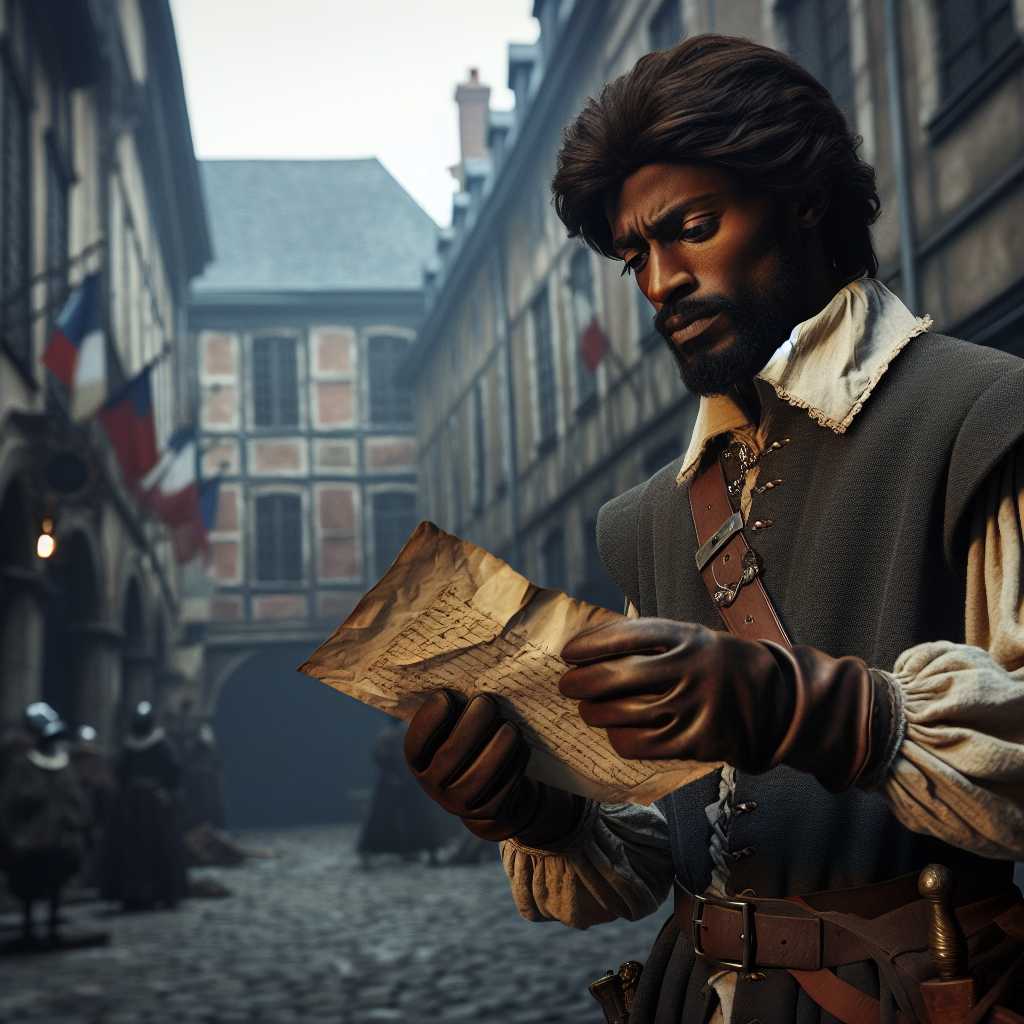
In the heart of 17th-century Paris, beneath the ever-watchful gaze of the grand Notre-Dame Cathedral, there was a tale seldom shared, often whispered in the dim corners of alehouses and shadowed nooks of the bustling streets. It was a tale of intrigue, honor, and mystery that began with a lone musketeer—a man whose name has nearly succumbed to the ages, known only as Philippe Désiré Leclair.
Philippe was a man of imposing stature with a presence that could silence a chattering room. His eyes were pools of stormy blue, reflecting a thousand unspoken stories, and his heart bore the weight of a duty he carried for the King of France, Louis XIII. The year was 1629, a time filled with the swirling winds of change and the clash of ideologies. France was a cauldron of ambition, and within this cauldron lay the secrets of those loyal to their oaths.
One such loyalty was that of Philippe to the captain of the Musketeers, the famed d'Artagnan. Together, their valiant exploits had stymied plots threatening the very fabric of the French court, but not without creating their own tapestry of secrets. Among the hushed secrets, one was particularly perilous, involving a letter—a single slip of parchment that could ignite or quell the fires of war between rival nations.
"Beware the shadowed hand that writes in the darkness," the letter cautioned. "For its ink carries the blood of kings and queens."
The letter's existence was known to only a select few within the inner circle of the Musketeers, and it was Philippe's duty to see it safely delivered to the one who bore the crown. However, word of its journey escaped the corridors of secrecy and into the ears of the malicious Cardinal Richelieu, a man as cunning as he was ambitious, who sought to intercept the letter at all costs.
That crisp autumn evening, as the golden rays of the setting sun washed over the cobblestones of Paris, Philippe set out with his trusted companion, Jacques, a musketeer of fierce loyalty and quick wit. Their journey would take them through alleys and archways, past the hum of distant lute music and the lingering aromas of bread from corner boulangeries. But this was no evening promenade; danger lurked with every step.
As they approached a less-traveled path leading to the outskirts of the city, a swift movement caught Philippe’s eye. A shadow detached from its hiding place and refashioned itself as a figure draped in the crimson vestments of the Cardinal's guards. Their intent was clear, and their numbers, formidable.
Under the cloak of night, a fierce melee erupted. Blades clashed with the intensity of lightning against steel. Jacques, ever nimble, parried and thrust with the grace of a dancer, while Philippe wielded his sword as a chisel carving through stone. The sound of metal reverberated amidst shouts and the echo of booted feet.
Philippe's mind was a whirlwind of focus and peril, his only thought to protect the letter—a single line from the quill that could change the course of history. But even as the last of the Cardinal's men fell, securing victory, Jacques fell to his knees, clutching his side where a wicked blade had sunk deep.
Philippe knelt beside his fallen comrade, his hands already stained with promise and danger. "Hold on, Jacques," he urged. But the faint smile on Jacques' lips spoke of a deeper understanding, of an acceptance of fate embraced by men such as he.
"The letter, Philippe," Jacques whispered, his eyes reflecting the solemnity of dusk. "See it safely there."
Philippe nodded, his heart aching with the weight of loss. With one last nod to his brave companion, he rose, girded by both grief and determination. Despite Jacques' sacrifice, he resolved to carry out their mission, for the throne depended upon it.
The remainder of the journey was stealth itself, a secretive waltz through the veils of night. When Philippe finally reached the Louvre, he stood before the chamber of the king, his shadow cast long and deep across the polished floors. The guard, seeing both the state of Philippe's tunic—tattered and bloodstained—and the emblem he bore, allowed him passage without word.
It was within the walls covered in tapestries and the echo of brocade that Philippe presented the letter to the king, receiving the solemn nod of both gratitude and understanding. The letter would tilt the scales, a bold move across the chessboard of nations.
With his task accomplished, Philippe bowed once more and disappeared into the night, merging with the shadows of history. Yet, even as the mists of time closed around him, whispered tales of the valiant musketeer and his steadfast friend Jacques lingered, carried on the echoes of Paris, forever weaving their legacy within the tapestry of destiny.
The story of Philippe Désiré Leclair, the musketeer with a heart of steel and secrets untold, remains one echo lost in the annals of history—as whispered by story-tellers, forever lighting our imaginations with his deeds of derring-do.










